Turkish Spring Despite Police Violence and Censured Media
by Tarık Günersel / June 21, 2013 / 3 Comments
The environmentalist human rights demonstrations may be the first steps of a democratic revolution.
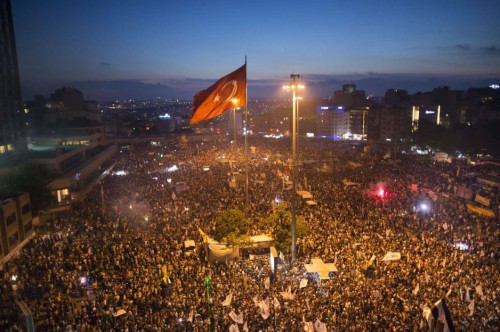
Istanbul's Taksim Square on June 15. Photo: Wikimedia Commons.
Events have been progressing rapidly in Turkey these days. So much information is being released on social media as it’s happening that it’s difficult to keep track of it all. Other reports come in days after their events have occurred, and state media has all but ignored the protests. Because of the inconsistent timeline and the government’s misinformation, today it seems more important to relay my observations of what has been happening and how it is happening than when it all took place. What follows are my notes from this month on the Turkish Spring, the protests in Gezi Park, and the government’s response.

- Life is words in action, literature is action in words.
Humans are about to destroy their spaceship Earth. Some of them are aware of this and they try to change the course of events. Will they succeed? Will more humans be alarmed and do something?
Literature is vital and translators are messengers of world peace.
Though I shall focus on the literary scene in Turkey and its problems regarding freedom of expression, I shall not omit the other parts of our planet. Today local is global and vice versa. 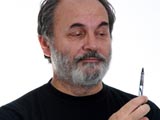
- Tarık Günersel is a poet, playwright, aphorist, librettist and short story writer. He is the president of PEN Turkey and an ex-member of the PEN International Board. He studied English Literature at Istanbul University. A self-exile after the military coup in 1980, he spent four years in Saudi Arabia with his wife Füsun and their daughter Barış, teaching English. A dramaturg at Istanbul City Theater since 1991, he has acted on stage and screen and directed some of his plays. He proposed World Poetry Day in 1997 which was accepted by PEN International and declared by UNESCO as the 21st of March. His translations into Turkish include works by Samuel Beckett, Vaclav Havel and Arthur Miller. His works include The Nightmare of a Labyrinth (mosaic of poems and stories), and How’s your slavery goin’? His Oluşmak (To Become), a “life guide for myself,” includes ideas from world wisdom of the past four millennia.
Turkish Spring: Music, dancing, singing, joyful and peaceful solidarity of different people who want democracy.
“This is more than a resistance. This is a revival, a rebirth.”
“Too many policemen, too little justice.”
Turkish Spring: An environmentalist and a pro-democracy movement that is the joint product of a wide range of factors across the social, cultural, and political spectrum.
“This morning hundreds of police and water cannon vehicles marched into Taksim. There has been a peaceful environment for 10 days there. This morning at 7:30 people were still sleeping in their tents or having breakfast. When the police attacked with gas bombs a group of about 30 provocateurs who were NOT among us, NOT activists, NOT among the people who resisted, started attacking the police with molotov cocktails. Curiously enough the Tomas (water cannon vehicles) that are able to push away and separate hundreds of people within seconds (as we have seen many times in the last two weeks) could not get rid of this group of provocateurs for over an hour now. Why? This is all a planned game to be played in front of the international media. The resisting people are still peaceful, they do not throw stones or molotov cocktails!!! This is a set up!”
A Tweet from a protester on June 11, at 10:18 PM: “They took us to square the circle. They come to destroy. We are trapped in hotels. We can’t go out. There is a continuous gas inside. We breathe gas for two hours. We’re about to drown. This is atrocity.”
Police violence against the demonstrations has come in waves for weeks. In late May a young woman in red became the symbol of the peaceful pro-green and pro-democracy protests when video of a police officer violently attempting to remove her from Gezi Park was released. After hiding her identity for a few days, she revealed that she was an academic and re-emphasized her support in the struggle for democratization.
Over the course of these protests thousands of us have been brutally harmed by the police. Many have broken an arm or other limb. Some have lost an eye from the rubber bullets and tear gas canisters that the police have misused. More than “just a few” demonstrators have been killed.
A nearby mosque became a refuge for peaceful demonstrators, most of whom had been wounded by the police.
Now it’s 9:00 PM in Turkey on June 11, and demonstrations have once again begun in many cities: Millions of people are protesting against the Prime Minister and his government. They are peaceful demonstrations in favor of the environment and democracy. Maybe most of us were apolitical until two weeks ago, when the police first attacked, but the despotic attitude of Recep Tayyip Erdoğan and his government brought fear to the majority of our people. Then, as May ended, the fear suddenly ceased: Protests began.
But we are not a homogeneous group of people. On the contrary, there is a great variety out here: Academics, students, journalists, laborers, the elderly, children, citizens. On average, the Gezi protesters are 28 years old; 79% are not affiliated with any political organization and 45% are attending a protest for the first time. Nevertheless, it seems we all have one thing in common: We want a truly democratic country where human rights are taken seriously. Erdoğan’s government has been leading our country to the opposite end.
Here are our demands:
1. Istanbul Gezi Park must remain a PARK.
2. The authorities responsible for the police attacks must RESIGN.
3. TEAR GAS must be forbidden.
4. All the arrested protesters must be RELEASED.
5. STOP BANNING public gatherings. All the public squares must be used by the public FREELY.
When I was in Gezi Park I addressed Prime Minister Erdoğan on capul.tv, an amateur TV program stationed in the park. I said, “You make your salary thanks to our taxes, but you swear at us. You misinform the public. You should learn from Yusuf Has Hajib, who in the 11th century, said: ‘A leader should be calm; anger is an enemy of knowledge.’ One of the meanings of çapulcu is ‘one who disobeys the order.’ In life sometimes one becomes either dishonest or a çapulcu.” “Chapulling” has become a word in English.
On June 11, the police invaded the Palace of Justice in Istanbul, whereupon they brutally and illegally arrested 43 lawyers.
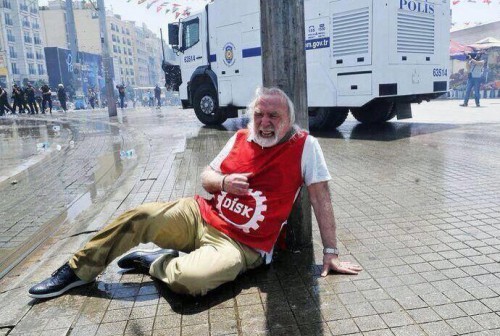
Turkish artist Mehmet Güleryüz attacked by the police during protests at Taksim, Istanbul. Photo: Courtesy of T. Günersel.
On June 15, the police brutally attacked the protesters stationed in Gezi Park upon Prime Minister R.T. Erdoğan’s order. Hundreds of peaceful demonstrators in the park, including children and the elderly, were gas bombed. Around 400 arrests were made. Overall, during 19 days of demonstrations, four protesters have been killed by the police, 12 people have lost an eye, six thousand people have been wounded, and some of them have been tortured. Erdoğan keeps insulting, misinforming, and provoking. With this recent crackdown, massive demonstrations for democratization will likely continue, both inside and outside of Turkey.
On June 16th, the government prevented a gathering in Taksim Square while also launching a pro-government demonstration in another part of Istanbul. Around 200,000 people were provoked by Erdoğan, who provided misinformation and tried to discredit the Gezi Park Resistance. “His” newspapers claimed that a million people were there!
More and more people in Turkey no longer trust Erdoğan and his government. Most people see that his oppressive measures have led the mainstream media into a pattern of self-censorship and that democratization is not possible under his leadership. And contrary to official propaganda, the economy has serious problems.
June 19th. A delegation of writers from PEN Turkey, the Writers’ Syndicate of Turkey (TYS), and the Literary Association (Edebiyatçılar Derneği) hold a meeting and press conference in Antakya, which is on the Syrian border. We have prepared a joint declaration against war and in favor of peace and have invited all the people and organizations in the world to support human rights. We have visited several trade unions and NGOs. We have visited the mourning family of Abdullah Cömert, the first youngster killed by the police in the peaceful demonstrations. Authorities have not found a suspect among the policemen at the time of Abdullah’s murder. Millions of people share the despair and anger of Abdullah’s mother, father, brothers and friends.
Creative peaceful protests grow in many cities despite the government’s unfair and brutal use of the media and the police force. Only a minority of the protesters have reacted using counter-force. Peaceful protesters have constantly been attacked, not only in Istanbul, but also in Ankara, Izmir, Eskişehir, and other cities.
Remember: Hitler was elected too.
The term “Turkish Spring” is debatable for some protesters and sympathizers because of the unpleasant outcome of the once-promising Arab Spring in Egypt and elsewhere. I like the term. The environmentalist human rights demonstrations may be the first steps of a democratic revolution in Turkey. International solidarity is vital. Thank you all who have been supportive.
Additional Material
Visual Time line of Taksim Square / Gezi Park Protests
Turkish
English

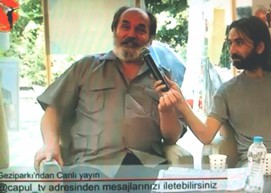
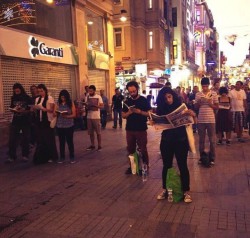




3 Comments on "Turkish Spring Despite Police Violence and Censured Media"
What is happening in Gezi is a carbon copy of what happened in Tahriri
in January 2011. Your resistance is brave and heroic , but be ware of
those who sneak to rob revolutions .All the world is witnessing the بailure of
Islamic rule to disguise in democracy make up.Our resistance will prove that
Religious rule is a Fiasco.
What is happening in Gezi is a carbon copy of what happened in Tahrir Square
in January 2011. Your resistance is brave and heroic , but beware of
those who sneak to rob revolutions .All the world is witnessing the failure of
Islamic rule to disguise in democracy make up.Our resistance will prove that
Religious rule is a Fiasco.
Gezi Park Demokratie
„Das Unberechenbare“ Das Andere Das Ereignis Das Subjekt Poem
„I get my emotion you played with my emotion“
Das Spiel mit der Emotion ist das Unberechenbare des Ereignisses.
Jedes Ereignis beherbergt Zukunft, Hinzukommendes, –
mithin Unberechenbares.
Nicht-Berechenbares , nicht der Ordnung des Berechenbaren, des Planbaren angehörend.
Das „Andere“ entspringt stets der Figur des U n b e r e c h e n b a r e n .
Genaugenommen ist das „Unberechenbare“ die Definition des „Anderen“.
Das Andere geschieht, indem es an-kommt, permanent ankommt
als unvorhersehbares Ereignis.
Der S a t z v o m G r u n d legt „Rechenschaft“ ab.
Das Subjekt, – jedes Subjekt heute, muß wissen, – muß verantworten: Die unberechenbare Ankunft des Anderen.
Der Satz vom Grund kalkuliert nicht das Andere, das Unkalkulierbare, das Unberechenbare,
das Individuum, das Subjekt, das Subjekt des Begehrens, die Politik des Begehrens und des Begehrenden.
Die Unberechenbarkeit des Begehrens.
Die Unberechenbarkeit der Politik des Begehrens.
Die Unberechenbarkeit der Politik.
Die Unberechenbarkeit des Demokratischen in der Demokratie.
Die „Maschine“ des Politischen geht über das Berechenbare einer Politik hinaus.
Über das Unberechenbare einer Politik von „unten“ und
über das Unberechenbare einer Politik von „oben“ hinaus.
Das Spiel mit den Emotionen.
Psycho-Schrift ….. Gramma (altgr.) …… Grammé (altgr.)…… Grammatologie (Derrida)
Das Unvorhersehbare und der zivilisierte d e m o k r a t i s c h e Umgang damit !
((Gerhard Anna Concic-Kaucic, Schriftsteller; Grammatologe, Philosoph (Gerhard Kaucic, Dr. phil.), Wien, Österreich))
Translation:
Gezi Park Democracy
“The Unpredictable” The Other The Event The Subject Poem
„I get my emotion you played with my emotions“
Playing with emotion is the unpredictability of the event.
Each event hosts future, adding the Coming, –
therefore unpredictable.
Non-calculable, not the order of the calculability and not the predictability of belonging.
The “Other” always rises the figure of the “Unberechenbaren” / „incalculability“.
Strictly speaking, the “Unpredictable” is the definition of the “Other.”
The Other is done by its advent/arrival, arrives permanently
as an unforeseeable event.
The Satz vom Grund / the principle of reason is based on „accountability“.
The subject – any subject / self today needs to know : The Unpredictable
Arrival of the Other.
The principle of reason does not calculate the Other, the incalculable, the unpredictable,
the individual, the subject, the subject of desire, the politics of desire and the politics of the self of the desire.
The unpredictability of desire.
The unpredictability of politics of desire.
The unpredictability of the policy.
The unpredictability of the Democratic in democracy.
The “machine” of politics goes beyond a predictable policy.
Above the unpredictable of a policy of “the people” and
about the unpredictable of a policy of “the establishment” .
Playing with the emotions.
Psycho-writing ……Gramma (gr.) …Grammé (gr.)…… Of Grammatology (Derrida)
The Unpredictable and the civilized democratic dealing with it.
(( Gerhard Anna Concic-Kaucic, writer, philosopher,…, Vienna, Austria; ))